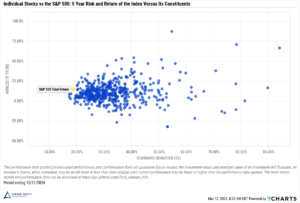If you invested in a startup or small business (founders, employee exercise of stock options, business owner), you need to know about qualified small business stock. If eligible, you may be able to exclude up to 100% of the gain from federal taxes when you sell your shares through the capital gains tax exclusion. The potential tax savings simply cannot be understated.
Qualified small business stock (also called QSBS or Section 1202) has the potential to save millions (even tens of millions) in taxes. But before you can claim a capital gains exclusion on section 1202 stock, you must understand eligibility requirements and be able to support it.
What is qualified small business stock (Section 1202 stock)?
Using IRS Section 1202, taxpayers can sell stock potentially free of federal capital gains taxes if the requirements are met. This article is meant to be an easily-digestible introduction to QSBS. It is not personal legal/tax/financial advice or an exhaustive discussion of the exclusion.
QSBS rules and eligibility requirements
The central elements in meeting the requirements for a qualified small business capital gain exclusion are:
- Stock was acquired at original issuance on or after August 11, 1993 from a domestic C Corporation. Shares must be exchanged for money, property (other than stock), or compensation for services performed for the issuing corporation.
- At any time before and right after issuance, the company’s aggregate gross assets were less than or equal to $50 million¹. Generally, gross assets mean cash and adjusted tax basis in property held by the issuing corporation.
- Hold the stock for at least five years. If you have stock options, your exercise date is the date you acquire the stock. In general, the original purchaser of QSBS must be the seller claiming the Section 1202 exclusion.²
- At least 80% of the company’s assets must be used in qualified trades or businesses. This excludes a trade or business where the principal asset is the reputation or skill of one or more of its employees (e.g. professional services, consulting, law, health, financial services, farming, among others). Also note that holding too much non-operating real estate, cash, and/or portfolio assets can disqualify stock from Section 1202 and jeopardize the QSBS tax exemption.
- Significant stock redemptions (buybacks) by the issuer can disqualify shares from meeting the requirements of Section 1202. Redemption tests include whether the corporation repurchased stock from you (the shareholder seeking QSBS status) or relative within a 4-year period (2 years before and after issuance) or redemptions from any shareholder within a 2-year period (1 year before and after issuance).³
This isn’t an exhaustive list, but a summary of the primary elements. This article has more detailed information on qualifying. Discuss your unique circumstances with your CPA. For federal income tax purposes, structuring transactions and planning for capital gains exclusions related to QSBS are crucial.
Video: Qualified Small Business Stock (QSBS): Explaining IRC Section 1202
Section 1202 tax treatment: the qualified small business stock exclusion
If you have Section 1202 shares, the gain you’re able to exclude from federal long term capital gains tax at sale depends on your gain and the date the stock was acquired. If you have stock options, your exercise date is the acquisition date.
2 components of the gain exclusion: greater of $10 million or 10x basis
Each year, a taxpayer with section 1202 shares can exclude the greater of 1 or 2 below:
- $10 million cap, reduced each year by any previous sales of QSBS stock from the same issuer using the $10M cap
- 10x basis, calculated each year QSBS is sold, per taxpayer, per issuer
Simple example: Jack has QSBS-eligible stock acquired in 2011. The total fair market value is $15M. He sells just enough stock this year to reach the gain exclusion $10 million cap. Next year, if he sells $2M worth of stock with an aggregate adjusted basis of $5,000, his gain exclusion will be $50,000 ($5,000 x 10). The remaining gain will be subject to long-term capital gains taxes.
Percentage limitation for stock issued before September 28th, 2010
In addition to the limits above, the exclusion may be further reduced depending on the date the stock was acquired:
- Between August 11, 1993 and February 17th, 2009: 50% exclusion
- Between February 18, 2009 and September 27, 2010: 75% gain exclusion
- After September 27, 2010: 100% gain exclusion
Stock not eligible for a 100% exclusion will have some slightly different tax treatment. The portion of the gain that’s taxable due to percentage limitations is subject to a 28% tax rate and the 3.8% net investment income tax (Medicare). In addition, 7% of the amount excluded is a preference item for the alternative minimum tax.
Remember, this is a summary of the tax implications for section 1202 of the tax code (as of 11/2024); it’s not tax advice! Discuss your situation with a tax advisor.
Caution: don’t disqualify your qualified small business stock
Certain actions by a company can disqualify its QSBS status, impacting shareholders’ ability to claim the QSBS tax exclusion. Even investing business assets in money market funds can impact QSBS eligibility.
Other examples of disqualifying actions include a company buyback of its shares exceeding a certain threshold or exceeding the $50 million gross asset threshold through fundraising rounds or inventory. It is essential for companies to monitor their QSBS eligibility regularly to avoid disqualification. Seek guidance from corporate legal and tax advisors.
State tax treatment may impact your QSBS tax benefits
State tax benefits may differ from federal income tax treatment explained here. This article has discussed federal tax treatment but realize states may follow their own rules. For example, California doesn’t adhere to the federal QSBS tax treatment.
Massachusetts previously had their own rules for qualified small business stock but after January 1, 2022, sales will conform to the federal guidelines. Unfortunately, the Commonwealth also passed a ‘millionaire tax’, which adds a 4% surtax to taxable income over $1M (indexed for inflation), even for one-time sudden wealth events.
Other tax planning opportunities and considerations with Section 1202
QSBS may not last forever
The Build Back Better bill aimed to limit the exclusion percentage to 50% for individuals with taxable income over $400,000. While this bill ultimately did not pass, QSBS has been targeted before and will likely be again.
Can you have Section 1202 employee stock options? Yes.
Founders and early startup employees often have shares that one day could qualify for the QSBS if managed properly. Purchasing restricted stock or exercising stock options early on (even before shares vest) is typically integral to helping ensure eligibility for small business stock tax benefits.
Planning strategies if the gain is over $10 million
The gain exclusion on Section 1202 stock is on a per taxpayer basis. To expand the tax benefits past the 10x/$10M limits, consider planning strategies such as gifting stock to family members. (Each taxpayer will have their own $10M/10x limits). Speak with an attorney about tax planning with QSBS and trusts.
Another potential strategy is to structure sales of Section 1202 stock to sell low basis stock first (using the $10M cap) followed by high basis stock (to use the annual 10x basis limit). Other strategies may be available depending on your situation.
Tax-free exchanges and rollovers of QSBS
M&A activity can hurt QSBS treatment if shares haven’t met the 5-year holding period. It may be possible to structure a rollover of QSBS stock using Section 1045 if the shares were held at least 6 months. It’s not always advisable, though. Sometimes a taxable rollover of QSBS is advantageous to lock in tax savings. These are only a couple of the factors to consider.
Considering converting to a C corporation
In the right situations, it may make sense to consider converting an S Corporation to a C Corporation and issuing new stock. Other types of entity structure may also enable Section 1202 eligibility for new stock. However, this route can be challenging. More mature companies may have difficulty staying under the gross asset requirements when new shares are issued. Like some of the other complex strategies here, this isn’t always easy or cheap to accomplish (if possible at all) so speak with an attorney and tax advisor.
Know the rules before hedging your position
An ‘offsetting short position’ during the initial 5-year holding period can invalidate QSBS status. This may include buying a put option, writing a call option, shorting the stock, or other similar strategies.
Substantiating your eligibility claim for the gain exclusion
There are no special substantiation requirements when filing to claim the QSBS gain exclusion. However, to be clear, taxpayers must be able to substantiate their claim in the event of an audit. But no extra supporting documentation is sent when filing (e.g. Form 8949 and Schedule D).
One of the main challenges facing stockholders with QSBS is they typically don’t realize they could have it at issue. Or perhaps the shareholder isn’t even aware of QSBS benefits at all. In more than one instance, we flagged shares for clients, resulting in substantial tax savings. It’s not always too good to be true!
It’s difficult to go back and justify a Section 1202 claim years later. So the best practice is to document early and often and get a QSBS opinion letter from the company. Also, ask the company to attest to the relevant facts (gross assets at issue, significant redemptions, engaging in qualified trade/business, etc.) and if they’re willing, also provide relevant company financials as backup. Gather your own records of stock purchases/exercises, redemptions, cost basis, gifts/transfers, and so on for safe keeping.
Sudden wealth advisors and stock option specialists
As evidenced by the length of this summary on the qualified small business stock exclusion from capital gains, the subject matter is complex. You may never have QSBS, and if you do, you may not be fortunate enough to qualify more than once. Strongly consider engaging a personal team of tax and financial advisors to help guide you through the process.
Darrow Wealth Management is a financial fiduciary and fee-only registered investment advisor. We specialize in financial planning for an IPO, acquisition, or sale of a private business. By now you know we don’t provide legal or tax advice, but we do help clients build a team of tax/legal specialists to tackle issues around company stock. Through ongoing financial advice and asset management, we aim to help our clients make the most of a sudden wealth event.
Schedule a call with an advisor
Footnotes
¹ Property contributed to the corporation is based on the fair market value when contributed. Certain related subsidiaries (controlled group) will count towards the $50M minimum. There are other considerations to discuss with your tax professional and/or tax attorney.
² There are some exceptions to this rule for QSBS acquired by gift, at death or as a distribution from a pass-through entity (partnerships, S corporations, regulated investment companies or common trust funds).
³ Consult a tax advisor as previously mentioned to discuss your situation. Calculating this is often tricky. Significant generally means an amount greater than 5% of the value of the stock. There are also certain purchases than may be disregarded including ‘de minimis’ redemptions.
Information in this article is for informational purposes only and should not be misinterpreted as personalized advice of any kind or a recommendation for any specific investment product, financial or tax strategy. This is a general communication should not be used as the basis for making any type of tax, financial, legal, or investment decision.
Last reviewed February 2025












